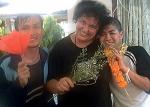I Used To Make Fun Of Rick Steves
Friday, March 20th, 2009I used to make fun of Rick Steves. No more!
Here are a few gems from a Salon.com interview just in case you don’t want to read to the end:
Salon: “Steves wants Americans to get over themselves. He wants us to please shed our geographic ego. Everybody should travel before they vote,” he has written.”
So if McCain and Palin had won, what would we have seen abroad?”
Steves: “More and more Americans wearing Canadian flags”
LOL. During 7 years of near constant travel, I used to say I was from Canada. My husband used to say he was from Iceland. I always said I wanted a T-shirt that said in 6 languages: “I didn’t vote for Bush.” Election night there were parties all over Mexico. Now they are watching us.
Steves: “As a travel writer, I get to be the provocateur, the medieval jester. I go out there and learn what it’s like and come home and tell people truth to their face. Sometimes they don’t like it. But it’s healthy and good for our country to have a better appreciation of what motivates other people. The flip side of fear is understanding. And you gain that through travel.”
What’s the most important thing people can learn from traveling?
Steves: “A broader perspective. They can see themselves as part of a family of humankind. It’s just quite an adjustment to find out that the people who sit on toilets on this planet are the odd ones. Most people squat. You’re raised thinking this is the civilized way to go to the bathroom. But it’s not. It’s the Western way to go to the bathroom. But it’s not more civilized than somebody who squats. A man in Afghanistan once told me that a third of this planet eats with spoons and forks, and a third of the planet eats with chopsticks, and a third eats with their fingers. And they’re all just as civilized as one another.”
The “ugly American” thing is associated with how big your country is. There are not just ugly Americans, there are ugly Germans, ugly Japanese, ugly Russians. Big countries tend to be ethnocentric. Americans say the British drive on the “wrong” side of the road. No, they just drive on the other side of the road. That’s indicative of somebody who’s ethnocentric. But it doesn’t stop with Americans. Certain people, if they don’t have the opportunity to travel, always think they’re the norm. I mean, you can’t be Bulgarian and think you’re the norm.
It’s interesting: A lot of Americans comfort themselves thinking, “Well, everybody wants to be in America because we’re the best.” But you find that’s not true in countries like Norway, Belgium or Bulgaria. I remember a long time ago, I was impressed that my friends in Bulgaria, who lived a bleak existence, wanted to stay there. They wanted their life to be better but they didn’t want to abandon their country. That’s a very powerful Eureka! moment when you’re traveling: to realize that people don’t have the American dream. They’ve got their own dream. And that’s not a bad thing. That’s a good thing.
That is certainly true of many people I have talked to around the world and most people I talk to in Mexico who have migrated to the north. The fruit seller speaks a little English. I ask if he has ever worked in the north. Yes, he and others say. Three years. Six years. Ten years, the guy in the tiny mountain village 7 hours from the nearest town in Guatemala says. The guy on the corner of my block whose wife sells tamales worked in the U.S. 30 years. But eventually they usually come back. If given an economic choice they would choose to stay in their own country where they can enjoy their own language, their own culture…and their families. One of my eureka moments. [read on]

